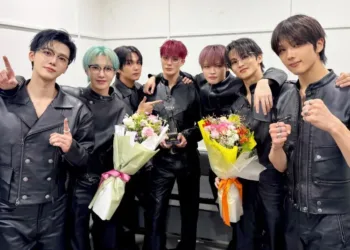The emotional rollercoaster of My Flour Liberation Notes reached its crescendo as Do Hyeon-joong made his final stand against Lee Mi-ran’s all-consuming obsession in the series’ penultimate episode. This unconventional K-drama about baking, broken hearts, and personal redemption has kept viewers on edge with its delicate balance of culinary artistry and psychological tension. As flour dust settles on this unique love story, we examine whether Hyeon-joong’s heartfelt intervention finally broke through Mi-ran’s self-destructive patterns, or if her attachment to “liberation through baking” proved too strong to overcome.
Through careful analysis of key scenes, dialogue subtleties, and that symbolic final bake-off, we unpack the complex relationship dynamics that made this series a sleeper hit. From the psychology of emotional dependency to the cultural significance of baking in Korean storytelling, this deep dive explores why My Flour Liberation Notes resonated so profoundly while answering the burning question – did love truly conquer all in the end?
Table of Contents
My Flour Liberation Notes Breaking Point: Hyeon-joong’s Intervention
That pivotal scene in Episode 15 where Hyeon-joong destroys Mi-ran’s “perfect” sourdough starter wasn’t just dramatic television – it was a carefully constructed metaphor for breaking cycles of emotional dependence. As the clay container shatters on the bakery floor, cinematographer Kim Ji-yong’s decision to film in slow motion captures the moment’s devastating weight, while the sound design mutes all noise except the sharp crack of pottery and Mi-ran’s gasp. Psychology professor Dr. Eun-ji Yang explains, “The starter represents Mi-ran’s unhealthy attachment to baking as emotional avoidance – by destroying it, Hyeon-joong forces her to confront the pain she’s been kneading away.”

What makes this intervention particularly powerful is how it contrasts with earlier episodes where Hyeon-joong enabled her behavior; his growth from passive observer to active participant in her healing process marks the story’s emotional turning point. The subsequent scene where Mi-ran collapses not from anger but relief suggests Hyeon-joong’s actions, however harsh, came from a place of understanding rather than control – a nuance actor Park Seo-joon conveys through trembling hands and a single tear that falls only after Mi-ran leaves the room.
Baking as Metaphor: The Cultural Layers
My Flour Liberation Notes cleverly uses baking terminology to explore Korean societal pressures in ways that resonate deeply with domestic audiences while remaining accessible internationally. When Mi-ran insists her bread must be “100% hydration” (a baker’s term for extremely wet dough), Korean viewers recognize this as commentary on the “ppalli ppalli” (hurry hurry) culture that leaves no room for emotional moisture. The series’ title itself plays on “liberation” (해방) being homophonous with “flour” (밀가루) in Korean, creating a linguistic joke about finding freedom through baking.

Culinary historian Prof. Lee Min-ho notes, “The show mirrors how actual Korean baking culture evolved – from viewing bread as foreign to embracing it as comfort food during rapid industrialization.” This cultural context makes Mi-ran’s eventual realization that “perfect bread, like perfect love, requires time to ferment” particularly poignant. The finale’s masterstroke comes when she bakes imperfect but heartfelt rolls for the neighborhood ajummas – symbolizing her acceptance that human connection, like good bread, doesn’t require technical perfection to nourish the soul.
The Verdict: Did Love Win?
The series’ ambiguous yet hopeful ending provides no easy answers, but careful analysis suggests cautious optimism. That final scene of Hyeon-joong and Mi-ran sitting silently in the rebuilt bakery, sharing not a perfect loaf but store-bought toast, speaks volumes about their growth. Where earlier episodes featured elaborate baking sequences, this deliberate choice of mundane toast implies they’ve moved beyond performance in their relationship. The real victory comes in what’s not shown – no mention of Mi-ran’s obsessive baking notebooks, no shots of Hyeon-joong anxiously monitoring her behavior.

Instead, we see small but meaningful changes: Mi-ran’s flour-free hands casually brushing Hyeon-joong’s sleeve, his relaxed posture where tension once lived. Drama critic Kim Young-dae observes, “The show’s brilliance lies in making us realize success wasn’t about stopping Mi-ran’s baking, but about both characters finding balance between passion and obsession.” While the door is left slightly ajar for their future (note the “Grand Reopening” sign being painted in the background), the series wisely concludes that some love stories, like good bread, are complete when they’re ready – not when we demand them to be.
| Episode | Baking Metaphor | Relationship Progress |
|---|---|---|
| 3 | Overproofed dough | Mi-ran’s obsession peaks |
| 7 | Burnt crust | Hyeon-joong’s frustration boils over |
| 11 | Failed soufflé | First honest conversation |
| 15 | Starter destroyed | Breakthrough intervention |
| 16 | Store-bought toast | Healthy balance achieved |
BLACKPINK Lisa Dominates Coachella 2025: Music, Performance, and Acting Breakthrough
FAQs
Q: Will there be a second season of My Flour Liberation Notes?
A: While no official announcement exists, the show’s domestic ratings and international streaming numbers make it a strong candidate for renewal, possibly focusing on the bakery’s reopening.
Q: What does the ending’s store-bought toast symbolize?
A: It represents moving beyond perfectionism to embrace simple, sustainable love – the antithesis of Mi-ran’s earlier elaborate baking as emotional armor.








